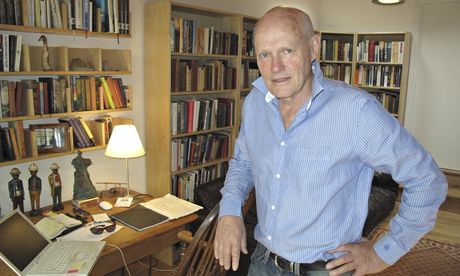
In his review of a previous Justin Cartwright novel, 2002’s White Lightning, DJ Taylor noted: “It is a desperately worrying thought that in another 10 years Justin Cartwright’s work might… prove in the end to be merely plausible but essentially flimsy pieces of manipulation, in which a stack of carefully marshalled and faintly exotic material and a decisive authorial voice mask what is actually a fairly large hole.” More than a decade later, Up Against the Night returns to similar themes as those explored in White Lightning, and for a good proportion of it, Taylor’s worries look to be well justified.
Taylor called Cartwright “one of the finest novelists currently at work”, but also, rather stingingly, catalogued his recurring schema and structures: a male protagonist from a moneyed trade drawn to a moment from history; women troubles; generational tensions; and a grand gesture to bring all these elements into sharp relief.
In Up Against the Night, Cartwright follows this blueprint to the letter, with Frank McAllister playing the wealthy narrator; the massacre of Boer leader Piet Retief and his men in 1838 providing the historical backdrop; an ex-wife and Swedish girlfriend adding the sexual frisson; a daughter, Lucinda, just out of rehab, and a young cousin, Jaco, enmeshed with Scientology; and a holiday to the place of Frank’s birth, South Africa, as the cauldron in which to throw the participants.
For such a well-worn series of tropes, the opening chapters of Up Against the Night are slow and disjointed, often reading like a sounding out of possible narratives, rather than a clear sense of where the novel is heading. Things seem to rather come and go without much enthusiasm – a curiously lifeless retelling of the historical massacre, generic memories of a South African childhood, several underwhelming descriptions of landscape – Frank only really firing into life when discussing his own moral and financial excellence, or describing how vile, crazy and self-obsessed Georgina, his ex-wife, is. Unfortunately, Georgina only flits around in the background; the perfect Swedish girlfriend, who resembles Agnetha from Abba, makes perfect Swedish meatballs and has a perfect teenage son who learns to surf in 10 seconds flat, is given an adoring, almost adolescent, centre-stage.
If Frank’s suffocating and didactic narration – which never pulls an opportunity for self-aggrandisement, for stating the obvious or for relating stilted, unrealistic conversations – is offputting, then the wayward plotting is just as distracting. How Lucinda manages to fly into South Africa on another woman’s passport with a black child is just one of many improbabilities which push the book towards its conclusion. And yet, when it finally gets on that track, another book – a quite superb one – begins to open up.
Without warning, Frank’s cousin Jaco takes over the narration – and it is a revelation. A counterpart to Frank’s certitude, Jaco is a mass of contradictions, a racist, a drunk, a mass of anger and resentment. For more than half the book, nothing has been at stake; then everything seems to be. There is a wonderful balance between Jaco’s sections and Frank’s, the suspense building as the two edge closer to each other as they cross the country. Why Cartwright left this to the later stages of the novel is a mystery, one as perplexing as why the aftermath of Jaco and Frank’s collision is only explored in a short coda. As a consequence, this is a frustrating reading experience, one that contains flashes of brilliance but cannot quite recover from its meandering beginnings.
Up Against the Night is published by Bloomsbury (£18.99). Click here to buy it for £15.19

